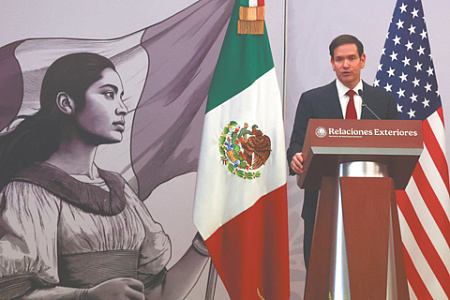
In a significant diplomatic shift, Washington and Mexico City are moving to mend a relationship strained by months of sharp rhetoric and threats from the White House. A recent visit by U.S. Secretary of State Marco Rubio to Mexico aimed to smooth over tensions that peaked with President Donald Trump’s suggestions of military intervention. Now, both nations have agreed to shelve past grievances and recommit to a joint strategy against powerful drug cartels and illegal migration, signaling a move from confrontation to cooperation.
While a widely anticipated new security agreement was not signed during the visit, both sides hailed the talks as a major breakthrough. Following a meeting with Mexican President Caludia Sheinbaum, Secretary Rubio declared that the two countries now enjoy “the closest cooperation” they have “ever had.” This statement marks a dramatic turnaround from a period in which President Trump had publicly chastised Mexico for its handling of border security and the narcotics trade.
The centerpiece of the renewed partnership is an agreement to tackle shared security challenges without resorting to the extraordinary measures previously floated by Washington. Just before Rubio’s trip, Trump told The Daily Caller that he had offered President Sheinbaum the use of U.S. troops to fight cartels on Mexican soil. “But she doesn’t want us to do it. Because she is afraid,” he claimed, underscoring the high-stakes pressure that has defined his administration’s approach.
This pressure campaign intensified over the spring and summer as the Trump administration grew more determined to curb the flow of drugs like fentanyl. The U.S. deployed nearly 10,000 troops to the border, accused Mexican banks of money laundering, designated several cartels as terrorist organizations, and threatened to impose crippling 30% tariffs to force Mexico into more decisive action. Trump has framed the fight against narcotics as a cornerstone of his presidency, a promise to his voters that outweighs even his stated personal admiration for President Sheinbaum.
For its part, the Mexican government argues it has already ramped up its efforts significantly since President Sheinbaum took office in 2024, adopting a far more aggressive stance than her predecessor, Andrés Manuel López Obrador. Her administration has arrested approximately 30,000 suspected drug traffickers, a stark increase from the 12,300 arrested during López Obrador’s entire six-year term. Furthermore, Mexico has deployed its National Guard to the northern border and extradited 55 high-profile cartel members long sought by U.S. authorities, actions that prompted Trump to suspend the tariff threat in August.
Despite these efforts, President Sheinbaum has consistently pushed back against what she views as excessive U.S. demands and threats to her country’s autonomy. “Under no circumstances will we permit intervention or any other foreign action that harms the integrity, independence, and sovereignty of the country,” she stated firmly during a recent address. Sheinbaum also insists that the U.S. must take responsibility for its role in arming the cartels, noting that the majority of weapons used by criminal groups are smuggled south from the United States.
This complex dynamic with Mexico reflects President Trump’s broader transactional foreign policy in North America. Washington has also used tariff threats to extract concessions from Canada, demonstrating a willingness to pressure its closest allies to secure deals it deems more favorable. Rubio’s visit suggests a potential stabilization across the region as the partners of the USMCA trade agreement seek more predictable relations. Still, with a mandatory review of the USMCA approaching, the potential for new disputes remains.
According to political analyst Vladimir Krotkov, Trump’s hardline stance is driven primarily by domestic priorities. “For the Trump administration, relations with Mexico and Canada are a priority,” he notes, explaining that the White House is attempting to reset these partnerships on pragmatic terms. Fulfilling key campaign promises on combating illegal immigration and drug trafficking is paramount for Trump, while his overarching economic goal is to reshore capital and manufacturing jobs to the United States. This political reality ensures that while the tone may soften, the pressure on Mexico is unlikely to disappear entirely.
